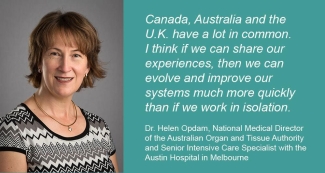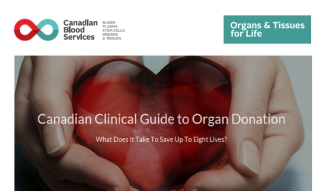Lessons from afar: International experts share organ donation experience
Thursday, May 23, 2019 Ross FitzGerald
Canadian Blood Services’ Donation Physician Network (DPN) connects clinical care physicians and provides access to educational resources including webinars on leading practices, clincial case studies, literature and emerging issues. In the spirit of international collaboration, experts in organ donation and transplantation from the U.K. and Australia recently shared lessons they have learned over the past decade as part of a series of webinars hosted by the DPN.
Lessons from afar
Dr. Helen Opdam of Australia and Dr. Dale Gardiner of the U.K. provide valuable perspectives in their presentations, respectively titled "Lessons from Down Under" and "Lessons from Across the Pond".
“Canada, Australia and the U.K. have a lot in common. I think if we can share our experiences, then we can evolve and improve our systems much more quickly than if we work in isolation,” says Dr. Helen Opdam, National Medical Director of the Australian Organ and Tissue Authority and Senior Intensive Care Specialist with the Austin Hospital in Melbourne.
Watch Dr. Opdam’s webinar, Lesson from down under
“We’ve been on a 10-year journey, which I think Canada and Australia have also been on,” says Dr. Dale Gardiner, Deputy National Clinical Lead for Organ Donation, U.K., and Adult Intensive Care Medicine Consultant. “My first lesson that we’ve learned in the U.K. is that success is possible.”
Watch Dr. Gardiner’s webinar, Lesson from across the pond
The U.K. and Australia share many similarities with Canada, politically, socially, legislatively and geographically. For the past decade, all three countries have been working to improve organ donation rates to increase the availability of organs for patients in need.
“I was asked in setting up this presentation to finish with giving some pointers to Canada, and I felt that was a bit presumptuous, because I feel that Australia has a lot to learn from Canada,” says Dr. Opdam, “What I really think I can do is share with you what actually happened in Australia, and it’s very much up to you to draw some lesson from that.”

Related blog posts:
- Highlights from the 2018 Canadian Critical Care Conference
- Recorded presentations from the 2018 Deceased Donation Symposium
- Expert guidance seeks to improve identification of potential organ donors: A Q&A with lead author Dr. Samara Zavalkoff
Visit Canadian Blood Services' Professional Education website to discover more resources and information related to organ and tissue donation and transplantation.
Canadian Blood Services – Driving world-class innovation
Through discovery, development and applied research, Canadian Blood Services drives world-class innovation in blood transfusion, cellular therapy and transplantation—bringing clarity and insight to an increasingly complex healthcare future. Our dedicated research team and extended network of partners engage in exploratory and applied research to create new knowledge, inform and enhance best practices, contribute to the development of new services and technologies, and build capacity through training and collaboration. Find out more about our research impact.
The opinions reflected in this post are those of the author and do not necessarily reflect the opinions of Canadian Blood Services nor do they reflect the views of Health Canada or any other funding agency.
Related blog posts
The Critical Care Canada Forum (CCCF) takes place this week in Toronto. The annual event is attended by hundreds of health professionals working in critical care, primarily physicians. A key event within the Forum is an unopposed plenary on brain death determination, to be held on Wednesday, November 7th.
Canadian Blood Services, Trillium Gift of Life Network and the Canadian Donation and Transplantation Research Program partnered to host the Deceased Organ Donation Symposium that took place at the Critical Care Canada Forum (CCCF) on November 7 – 8, 2018. The CCCF is a national forum attended by...
Collaboration leads to publication dedicated to supporting the critical care community in donor identification and referral allowing more potential organ donors to save lives, and more donor families to fulfill their loved one’s wishes


